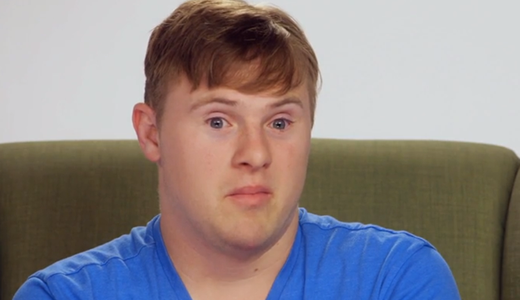I reviewed A&E’s Born This Way this week (the review will be posted later today). It’s a reality show that focuses on several young adults with Down syndrome, and a refreshing change from the many reality shows that are predicated on greed and selfishness and bad behavior. It’s a gentler program that, while not exactly wholesome, gives us characters who may look a little different than we do, but who, when it comes right down to it, aren’t that different at all. From my review:
The main players are just determined to do what we all do: They go to school. They look for jobs. They flirt. They watch movies. They strive for independence. They struggle with insecurities and heartache. They look for someone they can spend the rest of their lives with. The folks featured in Born This Way are, in most respects, very much like anyone else.
And they, like us, can be influenced by the media they watch.
Steven is one of Born This Way’s prime protagonists. In the episode I reviewed he’s preparing for a formal dance—the de facto prom in the area for young adults with Down syndrome. But frankly, Steven’s not quite sure if he’s all that interested in ladies from the Down syndrome community.
“I feel like people with disabilities talk about mostly love and marriage,” he says. “I think more about sex than marriage,” he says flatly.
There’s a suggestion that Steven’s dating outlook has been heavily influenced by entertainment. He’s an avid movie buff. His parents tell us that most of what he knows about romance has been from the movies. Steven says as much explicitly. He’s watched a lot of R-rated movies, he tells his best friend Sean. “I know what typical guys think about.”
That’s a really interesting statement, isn’t it? And I think that may be true for most of us. It is for me, at any rate. Before I ever started dating, my ideas of what love was about were shaped by the movies and television shows I watched.
I grew up in a pretty discerning home, but parents can’t keep track of everything. As such, I saw some television shows featuring love scenes and kissy-kissy moments growing up.
My earliest memories of such moments—before I was much interested in love or sex—can be summed up by these two basic impressions: One, I learned the rustling of clothes was really, really loud when you kissed someone. Two, couples always went to bed without any shirts on and always kept the covers pinned up to their shoulders.
As time went on, I learned a great deal more from movies and television. I learned that women are typically interested in dangerous, brooding types that smoked. Not being particularly dangerous or brooding, and knowing my parents would kill me if I started buying cigarettes, I almost resigned myself to a life of loneliness. But, at least, I knew what love would look like if, y’know, I should happen upon it: We’d hate each other at first, but still secretly be attracted to each other. Once we got together, we’d stare longingly into each other’s eyes. We’d walk around the occasional lake, have the occasional food fight. When we’d kiss, we’d kiss as if we were aliens trying to suck each other’s brains out. And naturally, we’d have sex before marriage, because that’s what couples apparently did.
Thankfully, I had other inputs to counterbalance what I saw on my big and small screens. My parents were pretty good role models, and even if the TV told me that sex before marriage was all well and good, Mom and Dad certainly didn’t. My friends, most of whom grew up in Christian homes, were level-headed , stabilizing influences. They all helped keep me on the straight and narrow through high school when I did start dating, and I learned that good dates don’t necessarily include a single food fight.
The point is this: We’re naturally curious people, and we all have to learn about the world somewhere. And inevitably, we tend to turn to the sources who know, or seem to know, more than we do.
That’s a dangerous thing when it comes to sex and the media. Movies and television are not particularly good teachers. It’s just one more reason to keep an eye on what your kids watch (and, really, on what you watch, too). And even more importantly, a reason why it’s important to talk with kids about what they’re watching; what they’re learning. They need your input. They need your advice. They need your wisdom. You’re a far better teacher than Joss Whedon or Woody Allen, a better source than ABC or HBO or even A&E.






Recent Comments